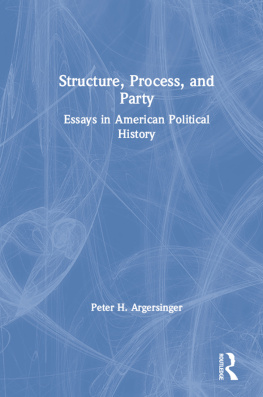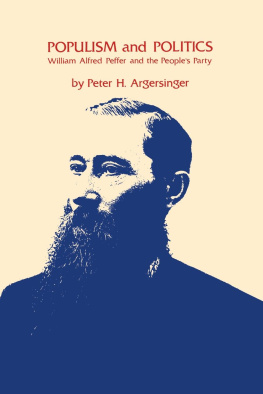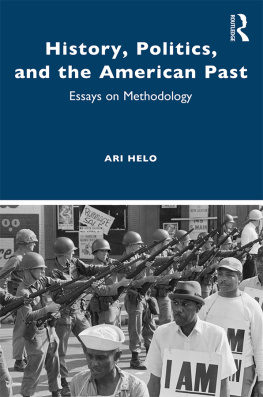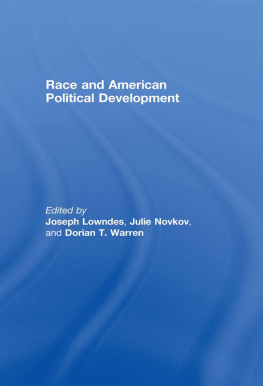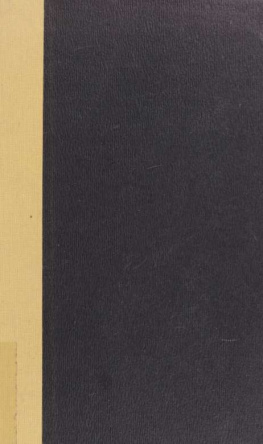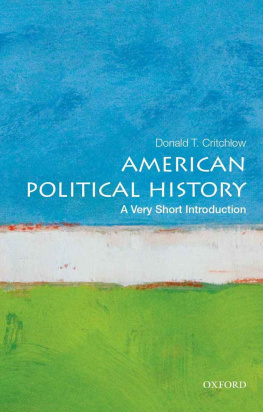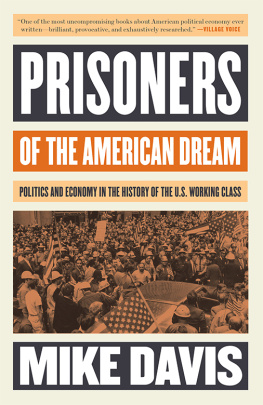STRUCTURE, PROCESS, AND PARTY
STRUCTURE, PROCESS, AND PARTY
Essays in American Political History
Peter H. Argersinger
First published 1992 by M.E. Sharpe
Published 2015 by Routledge
2 Park Square, Milton Park, Abingdon, Oxon 0X14 4RN
711 Third Avenue, New York, NY 10017, USA
Routledge is an imprint of the Taylor & Francis Group, an informa business
1992 Taylor & Francis. All rights reserved.
No part of this book may be reprinted or reproduced or utilised in any form or by any electronic, mechanical, or other means, now known or hereafter invented, including photocopying and recording, or in any information storage or retrieval system, without permission in writing from the publishers.
Notices
No responsibility is assumed by the publisher for any injury and/or damage to persons or property as a matter of products liability, negligence or otherwise, or from any use of operation of any methods, products, instructions or ide as contained in the material herein.
Practitioners and researchers must always rely on their own experience and knowledge in evaluating and using any information, methods, compounds, or experiments described herein. In using such information or methods they should be mindful of their own safety and the safety of others, including parties for whom they have a professional responsibility.
Product or corporate names may be trademarks or registered trademarks, and are used only for identification and explanation without intent to infringe.
Library of Congress Cataloging-in-Publication Data
Argersinger, Peter H.
Structure, process, and party : essays in American political history / by Peter H. Argersinger.
p. cm.
Includes bibliographical references (p. ) and index.
ISBN 0-87332-798-5
1. United StatesPolitics and government18651900. 2. ElectionsUnited StatesHistory19th century. 3. Political parties United StatesHistory19th century. 4.I. Title.
E661.A72 1991
324.97308dc20
919567
CIP
ISBN 13: 9780873327985 (hbk)
For My Parents
Marjorie Hayes Argersinger
and
William J. Argersinger, Jr.
I am grateful to a number of persons for their valuable help at various stages in the preparation of this volume. Many scholars gave me the benefit of suggestions and comments on one or more of the essays collected here. Jo Ann E. Argersinger, in particular, provided consistent encouragement, aid, and sound advice. Allan G. Bogue and J. Morgan Kousser also were especially and repeatedly generous in their kind assistance and wise counsel. Others whose support and suggestions proved important include Howard W. Allen, Ballard C. Campbell, Lewis L. Gould, John W. Jeffries, Paul Kleppner, Martin Ridge, David P. Thelen, Philip R. VanderMeer, and James E. Wright. Research grants from the Beveridge Fund of the American Historical Association and the Faculty Development Fund of the University of Maryland, Baltimore County, facilitated my work, as did the professional typing of Carol M. Warner and Linda M. Hatmaker. Michael Weber of M.E. Sharpe first suggested the publication of this volume, and his interest and encouragement made it possible.
The new political history is now nearly a commonplace, a phrase employed to describe a variety of approaches, methods, concepts, and topics that since the 1960s have significantly transformed the study of past politics. Traditionally, political history focused on particular events, specific campaigns, famous politicians; it relied primarily on literary sources, especially personal manuscripts; its presentation was narrative, as in biographies of presidents and senators. This approach persists, of course, and continues to make contributions, but it has surely been eclipsed by the new political history. The new work emphasizes the systematic analysis of structure and process, draws from the social sciences for both method and theory, exploits new source materials, especially quantitative data, and often focuses on problems and themes, institutions and electorates, rather than on chronological periods and famous individuals. Collectively, it has dramatically expanded and reshaped knowledge of the structure and operation of the American political system, developing new conceptual frameworks to explain political change, revealing the social correlates of electoral behavior, analyzing the evolution of party structure, determining the role of legal and institutional factors, and generally bringing new perspectives to past American politics.1 The essays collected in this volume are a part of these continuing developments during the past decade.
The scholarly origins and several of the leading concerns of the new political history are discussed in the first essay reprinted in this work. Commissioned for the inaugural volume of a research annual in political science, it surveys the historical literature on popular voting behavior, an undertaking that in itself suggests the interdisciplinary nature of the field. Because of the scope of its subject, I asked my colleague John W. Jeffries, a specialist in twentieth-century American political history, to join me in co-authoring American Electoral History: Party Systems and Voting Behavior. This essay centers on two major themes that emerge from the early historical work relying on social science perspectives and quantitative analysis. Both emphasize the crucial importance of political parties. The first is the concept of party systems and electoral realignments that portrays American political history as a series of electoral eras or systems, each with its own characteristic patterns of voting behavior, party identification, and political concerns. Periodically, major social and economic crises produce elections that realign voters partisan affiliations, shift party strength, and revise the saliency of issues, thereby creating another era or party system of political and governmental stability. The second major analytical concept of the new political history is the ethnocultural interpretation of voting behavior. Based on close examination of the local context of political life and analysis of census records, election returns, church records, and tax lists, this model holds that partisan cleavages in the United States have been primarily ethnic and religious rather than economic.
In providing systematic analyses of American political history and drawing attention to previously ignored issues, these two concepts have proved exceptionally influential and continue to shape theory, research, and synthesis in political history. Nevertheless, as our essay indicates, they have also been criticized on methodological, conceptual, and empirical grounds by a number of scholars. Nor have such criticisms abated in the years since we wrote our essay in 1983. Moreover, there are other important components of the new political history, some of which in fact provide perspectives useful for critiquing the realignment and ethnocultural models. These other subfields include the analysis of legislative behavior, the examination of the connections between voting and policymaking, and especially the investigation of the institutional features of American politics.2 The remaining chapters of this volume explore aspects of these other themes, particularly the last.
Here, too, historians drew from the social sciences. The modern behavioral approach to the study of politics, in political science as in history, initially encouraged scholars to devote more substantive and methodological attention to analyzing individuals, whether in small blocs or large groups, than to the institutional analysis of structural and organizational characteristics. There gradually developed, however, a reaction against what Rogers Smith has termed the treatment of legal and political institutions simply as epiphenomena of self-interested individual and group behavior. This renewed interest in institutions reflected a recognition that they were more than merely arenas within which political behavior occurred in response to more fundamental factors, such as ethnocultural interests. In particular, political scientists began to demonstrate a concern for the institutional framework of the electoral system and its effect upon what Walter Dean Burnham has described as the American political universe.3


